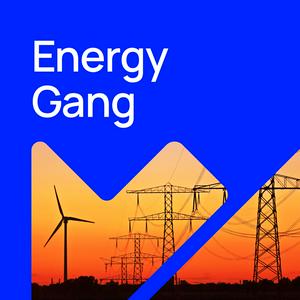Covering breaking news in clean tech, going deep on global energy policy, and debating the levers that need to move to accelerate the energy transition. Energy Gang is the podcast covering clean energy technology, renewable energy, and the environment. The world of clean energy moves fast, and you need a reliable source to stay on top of the news that matters. You’ll find it on Wood Mackenzie’s Energy Gang.How will changes to the US government affect decarbonisation and energy security? When will hydrogen, nuclear and carbon capture deploy at scale? Where’s the money for the energy transition green finance coming from and how much more is needed? What’s the outlook for EVs? What are the energy predictions for solar energy? What's the latest on climate change?Get answers to questions like these, bi-weekly on Tuesdays at 7am ET. Plus, get special live episodes recorded at the biggest climate and energy events throughout the year, like COP30 and Climate Week NYC. Don’t worry if you can’t make it in person, Energy Gang brings you all the updates on energy policy, energy finance and energy innovation you need to hear.Energy Gang is presented by Wood Mackenzie and hosted by Ed Crooks, Vice-Chairman of Energy at Wood Mackenzie and a former Financial Times and BBC News journalist. Regular guests are Amy Myers-Jaffe (Director of NYU’s Energy, Climate Justice and Sustainability Lab), and Dr Melissa Lott (Partner at Microsoft) – plus a roster of industry leaders and policy influencers, like Jigar Shah (Industry figurehead and former director of the Loan Programs Office in the US Department of Energy), Caroline Golin (Head of North America, Global Energy Market Development and Policy at Google) and Ambassador Geoffrey Pyatt (Former Assistant Secretary of State for Energy Resources).If you like The Energy Transition Show, Catalyst with Shayle Kann, The Big Switch from Columbia University, Open Circuit with Stephen Lacey or The Green Blueprint, you’ll enjoy Energy Gang.Want to get involved with the show? Reach out to
[email protected] to:Bring Energy Gang to your eventBe a guest on the showSponsor an episodeAsk a question to Ed Crooks or one of our guestsCheck out another leading clean tech global podcast by Wood Mackenzie, Interchange Recharged: https://www.woodmac.com/podcasts/the-interchange-recharged/Wood Mackenzie is the leading global data and analytics solutions provider for renewables, energy and natural resources. Learn more about Wood Mackenzie on the official website: https://www.woodmac.com/


